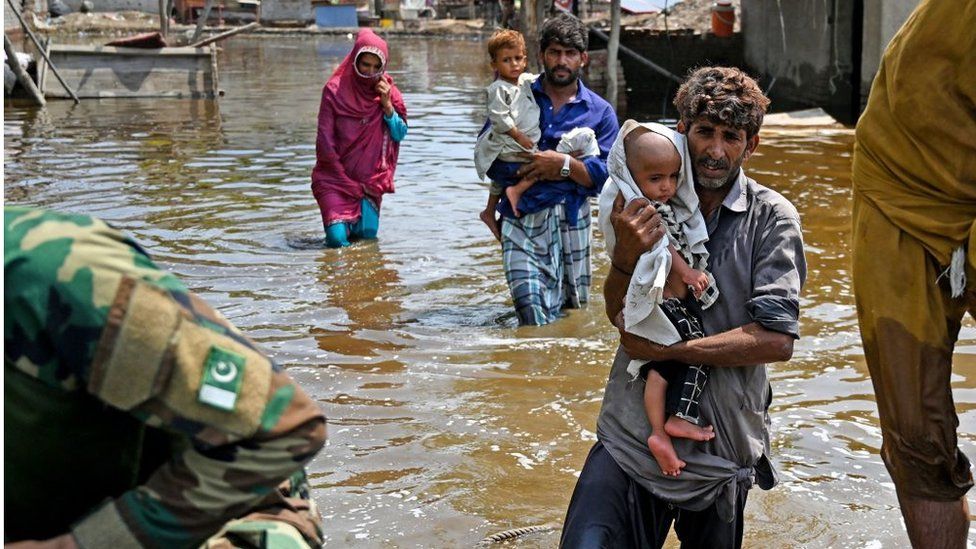ARTICLE AD BOX
 Image source, Getty Images
Image source, Getty Images
By Matt McGrath
Environment correspondent
There is "no credible pathway" to keep the rise in global temperatures below the key threshold of 1.5C, according to a bleak new UN assessment.
Scientists believe that going beyond 1.5C would see dangerous impacts for people all over the world.
The report says that since COP26 last year, governments carbon cutting plans have been "woefully inadequate".
Only an urgent transformation of society will avoid disaster, the study says.
There's just over a week until the next major climate conference, known as COP27, starts in Egypt.
Mindful of the fact that the world's attention has been elsewhere since climate diplomats met in Glasgow last year, this week has seen a flurry of reports underlining the fact that climate change hasn't gone away.
Answering questions from BBC viewers and listeners this week, the UN Secretary General António Guterres, said the world needed to re-focus on climate change or face catastrophe.
The BBC's climate editor Justin Rowlatt talked to UN chief António Guterres in New York
This gloomy mood among scientists and diplomats is underlined in today's release of the UN emissions gap study.
Now in its thirteenth year, the report analyses the gap between the rhetoric and the reality.
It concludes that the 1.5C threshold is now in serious peril.
This analysis finds that new efforts to cut carbon would see global emissions fall by less than 1% by 2030, when according to scientists, reductions of 45% are needed to keep 1.5C in play.
Looking at the impact on temperatures, the study finds that with the current policies in place, the world will warm by around 2.8C this century.
Image source, Getty Images
Image caption,Drought in California has seen water levels in lakes and reservoirs decline
If countries get financial support and put into practice the plans they have made, this can be limited to 2.4C.
"We had our chance to make incremental changes, but that time is over," said Inger Andersen, Executive Director of UNEP, who produced the study.
"Only a root-and-branch transformation of our economies and societies can save us from accelerating climate disaster," she said.
The UN acknowledges that achieving massive cuts in emissions is now a tall order. But it points to electricity, industry, transport and buildings as areas where rapid transformations away from fossil fuels can be made.
"We've got to take climate change with us wherever we go," said Ms Anderson.
"Into the classrooms, into the boardrooms, into the voting booth, over the dinner table. We cannot let go of climate change."
As well as highlighting the slow pace of progress on tackling the causes of warming, other studies published this week show that governments are failing to prepare for the impacts of higher temperatures.
In the UK, a committee of MPs and peers says the government needs to "get a grip" on the risk to critical infrastructure posed by a warming climate.
Image source, Getty Images
Image caption,Firefighters battle blazes in the Amazon
The report of the Joint Committee on the National Security Strategy cites examples where severe weather has overwhelmed transport and communications.
These include the deaths of three people from a train derailment in Scotland after heavy rainfall in August 2020, and the loss of electric power by almost 1m people during Storm Arwen in November 2021.
"The thing I find most disturbing is the lack of evidence that anyone in government is focusing on how all the impacts can come together, creating cascading crises," said the chair of the Joint Committee, Dame Margaret Beckett MP.
"There are simply no ministers with focused responsibility for making sure that our infrastructure is resilient to extreme weather and other effects of climate change."
While almost all the reports published this week underline the lack of progress on climate, there are some strong positives amidst the gloom.
The State of Climate Action study says that in transport, a transition to sustainable travel is well underway. Globally, almost half of the buses sold in 2021 were powered by battery electric or fuel cell electric engines.
Image source, Getty Images
Image caption,Electric buses are now almost half of all new sales globally
In passenger car sales, electric vehicles have doubled from the previous year to now account for almost 9% of new cars.
This note of hope is also reflected in the International Energy Agency's World Energy Outlook, also published today.
It argues that the energy crisis triggered by the war in Ukraine is causing changes that have the potential to hasten the transition to a more secure and sustainable energy system.
The report also finds that a raft of new policies in countries like the US, Japan, Korea and the EU will likely see clean energy investments of around $2 trillion by 2030, a rise of more than 50% from today.
Follow Matt on Twitter @mattmcgrathbbc.
Additional reporting by Esme Stallard

 2 years ago
40
2 years ago
40








 English (US) ·
English (US) ·